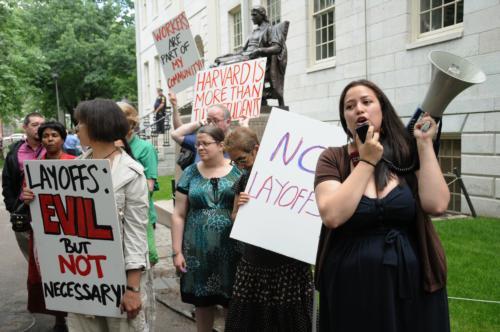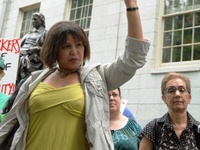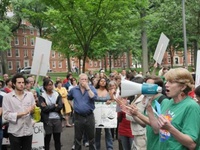Dozens of union activists, students, and University employees gathered in Harvard Yard Thursday afternoon to voice their outrage and disbelief at the hundreds of staff layoffs announced earlier this week.
Participants remonstrated University administrators for slashing the jobs of long-time employees while failing to issue pay cuts for themselves and top financiers. Speakers reiterated their belief that Harvard's top leaders' actions have been motivated by greed and financial self-interest and argued that the University's behavior has been unbecoming of its non-profit designation. One protester's sign even asked, "Harvard: University? or Investment Bank?"
"At this time, anger is a necessary thing," said Wayne M. Langley, director of higher education for the Service Employees International Union Local 615, to a cheering crowd. "People have to stand up, rise up, and defend our rights...this is only the beginning."
The rally's attendees included members from various local unions as well as the Student Labor Action Movement, Socialist Alternative, Women's Fightback Network, and even the Allston-Brighton Neighborhood Assembly.
On Tuesday morning, Harvard President Drew G. Faust and Vice President for Human Resources Marilyn Hausammann announced in e-mails that the University would be eliminating 275 staff positions in coming days, with administrative and professional jobs comprising half the cuts and clerical and technical jobs comprising the remainder. Approximately 40 other staffers would see their work hours reduced or shifted to a seasonal schedule, but trade workers would be largely unaffected, the e-mails noted.
Participants in the rally rejected the anticipated 30 percent decline in the University's endowment for this fiscal year as an adequate and honest justification for the layoffs. A recurring slogan used by protesters in recent months has been "Harvard has the money—no layoffs," and Tom Potter, a faculty secretary at the Law School and a participant in Thursday's rally, said he doesn't think Harvard has "any financial justification [for the layoffs] at all."
Similarly, Grace C. Ross '83, the Green-Rainbow Party's candidate for Massachusetts governor in 2006, said at the rally that she believed "there is no question Harvard has enough money" to avoid layoffs. Instead, she said, the University's administrators are all just "crying poor because they're no longer minting money on our backs."
But University spokesman Kevin Galvin noted that compensation costs account for half of Harvard's operating budget, and also pointed to the other cost-cutting measures implemented by the University before the layoffs, including a voluntary early retirement program, a salary freeze for faculty and non-union staff, and strictly limited hiring practices. He said that staff reductions have thus far been "spread evenly across our workforce," and noted that the average participant in the early retirement program had an annual salary of $67,000, with roughly half the participants working as hourly employees and half as administrative and professional staff.
Nevertheless, "these steps did not generate the savings we needed to achieve" to avoid layoffs, Galvin said.
Geoff Carens, a Harvard librarian and a member of the Harvard Union for Clerical and Technical Workers, used a loudspeaker to lead the protestors in chants that included "The people, united, will never be defeated" and "They say cutback, we say fightback; They say lay off, we say back off."
Carens told the crowd that Harvard is "fabulously rich" and assailed the University for cutting jobs and failing to "live up to its responsibility in our community" as a tax-exempt, non-profit organization during a tough recession.
Phebe Eckfeldt, a HUCTW member and staffer in the admissions office, similarly said at the protest that "a job is a right and Harvard has to give it to us." She also said that she believed "an orgy of speculation on the stock market" triggered the current crisis, and that the announced layoffs were an attempt to "bust" unions at the University.
Attendees of Thursday's protest also included at least two faculty members. Afsaneh Najmabadi, a professor of history and women, gender, and sexuality studies, said that layoffs were "not the only or the best option" to reduce costs at the University, and Brad Epps, a professor of romance languages and literatures and WGS, said he was "mad as hell" that workers had been laid off while senior faculty and administrators remain, to his knowledge, untouched.
Epps said he and other faculty wrote e-mails to the Dean of the Faculty of Arts and Sciences, Michael D. Smith, asking administrators to implement a "reverse sliding scale pay cut," in which those with higher salaries would take higher-percentage cuts. But Smith replied saying the option had been discussed but rejected, Epps said.
He added that if the fiscal crisis had truly necessitated "difficult decisions," referring to Faust's e-mail, the cuts "would have had a direct impact on senior faculty and administration." Instead, the announced layoffs are indicative of "institutional cowardice," Epps said, noting that he believes the budget-cutting process has not been conducted in an "open, transparent, productive way."
Attracting the attention of summer school students and visiting tourists throughout the hour-long protest, the crowd of protesters marched and shouted their way first to Mass. Hall and then to the Holyoke Center, where they brandished signs emblazoned with various anti-layoff slogans. Near the end of the rally, Carens led the crowd in chanting, "We'll be back."
—Staff writer Peter F. Zhu can be reached at pzhu@fas.harvard.edu.
Read more in News
Marathon Racers Run for Charity















